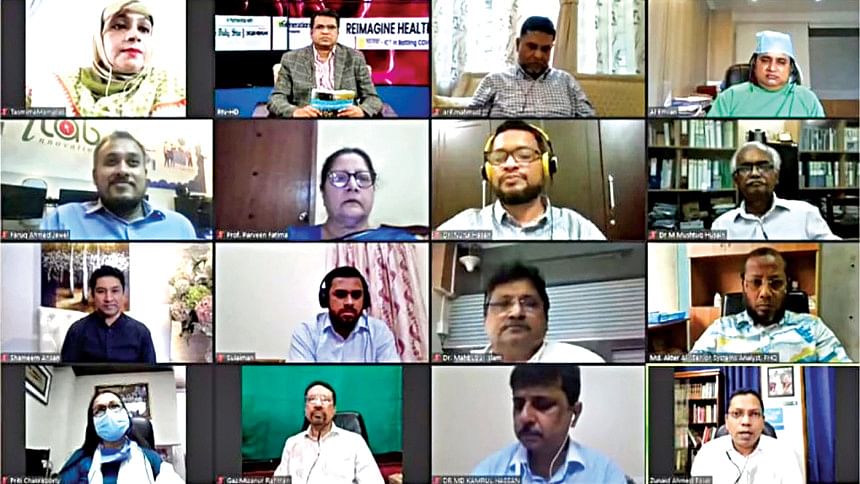Digital platform Shohojoddha to help in battle against Covid-19

The ICT division has joined hands with eGeneration to help people fight the ongoing Covid-19 pandemic by dint of technology.
To that end, a national digital platform named "Shohojoddha - A Plasma Network" has been formed.
As convalescent plasma therapy is a potential treatment for Covid-19, the platform was initiated collectively by the ICT division, Directorate General of Health Services (DGHS), A2i Innovation Lab, Sandhani and eGeneration to facilitate the collection and distribution of plasma in Bangladesh.
The information was shared at a webinar titled "Reimagine Healthcare: Shohojoddha - ICT in Battling Covid-19" on July 15.
eGeneration organised the event powered by RTV and in partnership with The Daily Star and the daily Samakal.
"The government has been taking strict measures to ensure the safety of its citizens during this uncertain time.
The Shohojoddha platform is intended to treat individuals suffering from this fatal disease," said Zunaid Ahmed Palak, state minister for ICT. The government seeks to constructively utilise the existing infrastructure to improve public health along with establishing new IT infrastructure, he said.
"To achieve this, it is vital to exploit partnerships with private organisations like eGeneration," Palak said.
"We are very proud to develop the technology platform for 'Shohojoddha' and contribute to this noble, life-saving initiative by managing the platform with ICT Division and a2i Innovation Lab," said Shameem Ahsan, chairman of eGeneration Group.
"Besides, eGeneration wants to help the public and private hospitals in the country fight against this pandemic with the aid of technology solutions such as ICU over the Cloud, Telemedicine, Tele-radiology, Hospital Management Information System, AI-based Chatbot etc in the same way we helped automate five hospitals of Border Guard Bangladesh with 500 beds."
Shohojoddha is a platform which will contribute immensely in the facilitation of plasma distribution within the country, said Faruq Ahmed Jewel, head of technology of iLab at A2i.
"Moreover, we can utilise technology to create a doctors' portal database which will include comprehensive and updated information of all doctors associated with our nation. This can improve the quality of our healthcare immensely."
It is needed to strengthen Bangladesh's ICT industry and be more accepting towards change, said Priti Chakraborty, chairman of Universal Medical College.
"There is a notion of resistance to any kind of transformation in our nation which is not only limited to the healthcare sector. We can start with vigorous trainings and by raising awareness among the general public for embracing digital healthcare services."
"The tools we possess to win this battle against the virus are very limited," said Arif Mahmud, head of medical service of Evercare Hospital.
However, a promising treatment for this ruinous illness is the plasma therapy which involves transfusion of plasma from coronavirus recovered patients, he said.
It is a popular belief that after an individual tests coronavirus positive, if the plasma transfusion takes place within the first 14 days, the success rate is projected to be very high, Mahmud added.
The statistics concerning the number of beds available in a hospital needs to be combined into a single platform and should be set up immediately as this will enable Bangladeshi residents to effectively track which hospitals they should visit for prompt assistance, said Mohammad Mushtuq Husain, consultant and chief adviser of the Institute of Epidemiology Disease Control and Research.
This will be a critical support for both, hospitals and patients, he said.
"The pandemic compelled me to utilise and rely on telemedicine to diagnose my patients which made me realise the importance of technology and the benefits it can provide if improved further," said Parveen Fatima, chairman of Care Hospital.
"To streamline our healthcare processes, we need the government to intervene and assist with the advancement of technology in Bangladesh."
"We need to urge more people to invest in creating more hospital management software which will automate processes starting right from patient registration to their discharge. This will tremendously reduce the inconvenience a patient usually experiences," said Al Emran Chowdhury, director and CEO of Bangladesh Specialized Hospital.
ICT has exceedingly advanced over the past few years, said Mahbubul Islam, director of the management committee of Labaid Group.
"However, we need to modernise the healthcare sector by implementing integrated medical services. The integrated medical services will ensure the delivery of outstanding, high quality and innovative care while creating an effortless experience for the patients which is both important and urgent in today's healthcare sector."
There is no strict standard health practice management maintenance in Bangladesh, said Gazi Mizanur Rahman, chairman of Gazi Medical College Hospital.
"For instance, the general public opt for a specialist for any health issue they may experience without consulting a general practitioner first. Before setting up an integrated IT infrastructure, we need to establish a standard health practice management."
The involvement of IT in the healthcare sector is extremely crucial if everyone wants Bangladesh to move forward amidst all the setbacks caused by this pandemic, said Sulaiman Ahmed, managing director of Oasis Hospital.
"The mindset of our physicians have changed overtime as we can witness the vast adaptation of telemedicine," said Tasmima Mamataz, senior consultant of Chittagong Port Hospital.
However, there is a gap in integration although most of the hospitals are using different hospital management solutions, she said.
A central national medical database can be created, which can store the patient's medical records with the help of technology as it will bring convenience for patients to transfer between hospitals, said Mohammad Akhter Ali, senior system analyst of Police Headquarters.
"Health tech solutions such as ICU monitoring system should have been implemented long ago which would have prepared us for facing a pandemic like this. Currently, we are now exploring different solutions and it is important to embrace such technologies now more than ever," said Kamrul Hassan, head of ICU at University of Science and Technology.
"It is not about investment in technology. It is more about the knowledge and mindset regarding it. Often times we witness that the patients and even our health practitioners are reluctant about the adaptation of technology," said Nurul Hasan, finance director of Oasis Hospital.

 For all latest news, follow The Daily Star's Google News channel.
For all latest news, follow The Daily Star's Google News channel. 



Comments